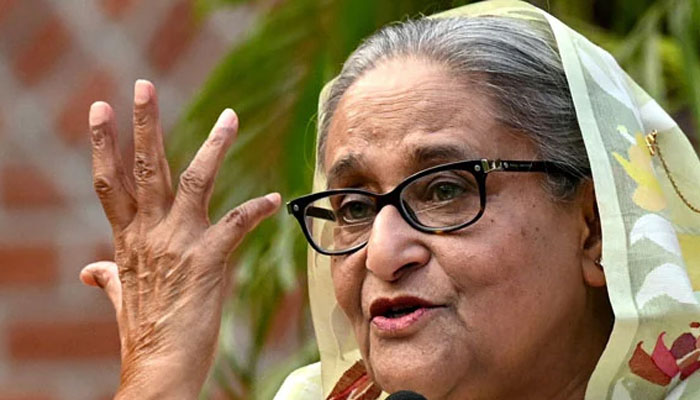
[ad_1]
After a demonstration demanding the elimination of the quota system started, it evolved into an anti-government campaign. On the Army Chief’s suggestion, Hasina Wajid gave up her position as prime minister after failing to withstand the pressure. Following Hasina Wajid‘s retirement as prime leader of Bangladesh on August 5, 2024, renowned economist and laureate Dr. Yunus was selected to take over as prime minister. The military establishment and student unions both agreed that Dr. Younus is a reliable person who can handle the domestic and international issues the state is currently facing as a result of Hasina Wajid’s narcissistic and dictatorial tactics. Bangladesh’s political environment is changing quickly: The “iron-fisted lady,” Hasina Wajid, resigned from her position as prime minister and the state due to the ongoing protests against the government. Why had she suddenly grown so weak that not even General Waker-Uz-Zaman, her personally chosen Army Chief, was able to defend her regime? The student demonstration proved to be the tipping point that ultimately brought her down, even though the odds had been stacked against her for years. The world media turned its attention to Bangladesh in July 2024 when thousands of students demonstrated against the quota system in the nation’s streets. Perhaps most individuals, no matter how competent they are, are denied access to government services because 56% of jobs were set aside for specific categories, including 30% for the relatives of the independence fighters. On the other hand, Sheikh Hasina was able to assert her ancestry from the liberation warriors by using the quota system to reassign Awami League personnel and sympathizers to government positions. Protests over the quota system erupted last month, and the demonstrations gradually evolved into an anti-government movement. On the Army Chief’s suggestion, Hasina Wajid gave up her position as prime minister after failing to withstand the pressure. The authoritarian attitude of Sheikh Hasina has caused conflicts to arise. Her fifteen years of leadership had made her conceited and inspired her to use Orwellian tactics to subdue her opponents, the students, rather than attempting to find a compromise to reduce tensions. She called out the protesters, traitors, and razakars, the Bangladeshi term for anyone who supported the Pakistan Army in the 1971 conflict. Furthermore, the imposition of curfews in major cities, the barring of communication networks, and the issuing of shoot-at-site directives for security services infuriated the opponents. Videos and images from Bangladesh surface, demonstrating how young people are defacing Sheikh Mujeeeb’s statues—the nation’s founding father—as a result of her oppressive government. Dr. Younus claims that Hasina has destroyed her father’s legacy. For the last fifteen years, Bangladesh has been a one-party state. The Awami League was the lone party deciding the fate of the state since Hasina Wajid had cornered the opposing parties. The leader of the main opposition party, the Bangladesh National Party, Khalida Zia, was imprisoned by the League administration in 2013 after Jamaat-e-Islam was outlawed. A source claims that to provide room for the Awami League, over 20,000 political leaders and workers were imprisoned a few months before the January 2024 elections. Due to the absence of political parties, the situation has reached a tipping point, leaving the student protestors with no other choice than to demand Hasina Wajid’s resignation and the dissolution of the Parliament as a political forum. Hasina Wajid’s downfall hasn’t happened overnight; rather, the circumstances have been deteriorating for years, and she is the one to blame.
A few reviewers likewise grab hold of all the happenings by surprise. Things are turning out such that the regime has altered on purpose rather than as a result of natural evolution. Given that Hasina Wajid has evolved into a state unto herself, there may be some unseen forces on the inside as well as the outside who wish to remove her. Given Bangladesh’s history of living under both direct and indirect military dictatorships, it is not difficult for the military to handle the situation. The sequence of events also suggests that the script may have been written in secret, with the students serving as only the props. These events include the students’ shifting demands, which range from the removal of the quota to Hasina’s resignation, the dissolution of the assemblies, and the creation of an interim administration led by Dr. Yunus. Whether or not the rumors are accurate, the entire incident has taught Pakistan and other states some wise lessons.
People’s attitudes and interests change over time, thus a government will always need the ambitions and support of the public rather than the endorsement of powerful institutions to legitimize its actions. It is also crucial to have an inclusive political system that gives opposition parties a meaningful role to stop non-political actors from taking advantage of the political divide. Last but not least, the issues facing the people must be actively discussed with them to solve them, as opposed to speaking negatively about them. No one will have to worry about their regime if the governments of Hasina Wajid and Gotabaya Rajapaksa, despite having strong roots and absolute power, couldn’t withstand popular resistance. This is especially true for those facing the same kind of socioeconomic crises that the two leaders have experienced in their respective states.
Akhalque Hussain
The writer is a freelance columnist. He can be reached at [email protected]
[ad_2]
Source link





